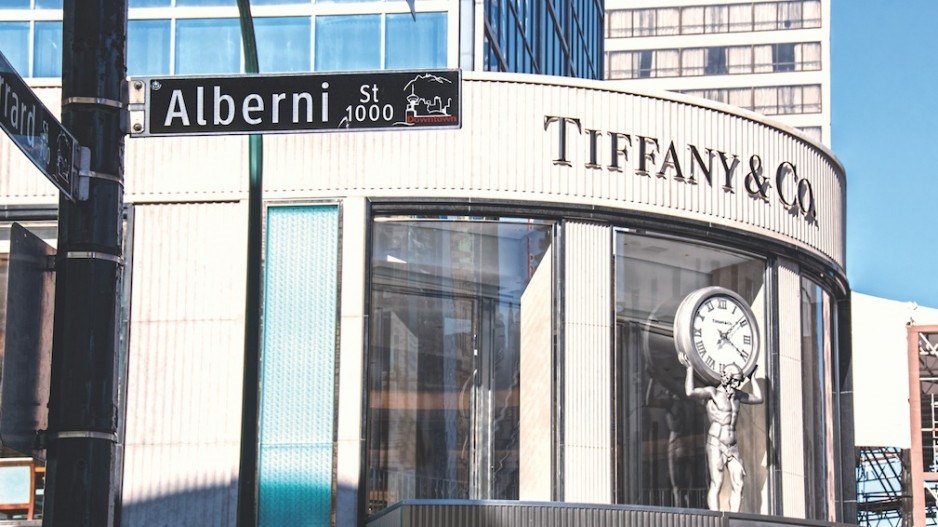Vancouver retailers are warily monitoring news but have yet to notice any downturn in business from shoppers’ fears of contracting the coronavirus 2019-nCoV, which has so far caused 494 deaths and 24,631 infections worldwide.
Even in the Alberni Street shopping district known for high-end shops and plenty of offshore-visitor consumers, store managers told Business in Vancouver that they do not believe shoppers are postponing visits out of a fear of getting the disease.
“Volume is pretty stable,” said Tiffany & Co. sales manager Frank Celentano.
“This was a very successful month for us. Traffic is a bit low, but the people who are coming in are spending.”
Manuel Bernaschek, who owns the Stefano Ricci store on West Georgia Street near the Trump International Hotel and Tower Vancouver, estimated that about 35% to 40% of his customers are visitors to Vancouver from China.
“We still have good days,” he said January 29. “The store was empty yesterday and today, but we had a good weekend.”
He is anticipating that there may be a slowdown in the weeks ahead but that things will then get back to normal.
“The disease has to become much bigger locally for it to impact retailers,” said DIG360 owner and retail analyst David Gray.
“Malls will be the first to feel the impact, versus street-front retailers, but I think it has to be a lot more significant than where we are right now.”
If a spate of new cases of infection arises, and particularly if there are deaths, Gray expects that people will be wary of going to public gatherings.
He believes consumers are being curious about the disease but viewing it as being far away and not yet something that they need to fear.
“We might be washing our hands more, and we’re probably more alert if someone is coughing around us, but I wouldn’t expect that there is much of an impact yet.”
Coffee shops and other public meeting places could be hit, he suggested.
Starbucks Corp.’s (Nasdaq:SBUX) shares slid more than 2% on January 29, a day after it told investors that it has closed “more than half” of its 4,123 stores in China, a country that represents about 10% of its global revenue.
The company had planned to raise its full-year guidance but put that hike on hold because of the unknown impact of the novel coronavirus on its business, Starbucks CFO Pat Grismer said on a conference call.
“The business impact is largely a function of two things: the number of stores closed and the duration of closure, and with respect to the duration of closure, it’s not entirely in our control,” Grismer said.
“We’re probably looking at early March at the earliest to reasonably assess the implications for revenue, operating income and earnings per share for our second quarter and for the full year.”
There are precedents for economic slowdowns as a result of global pandemics.
Studies show that the SARS virus, which killed 774 people and infected 8,098 people in the first half of 2003, had an effect on the Vancouver, and Canadian economy.
Tourism consultant Lyle Hall produced reports at the time. One showed tourism revenues in Vancouver fell 10 per cent, or $57 million, in the three months that ended May 31, 2003, compared with the same months in the previous year. Toronto’s tourism revenues fell 29 per cent, or $186 million, over the same time period.
A Conference Board of Canada report in May 2003 similarly found that Canada’s tourism sector was walloped hard by a general panic provoked by the SARS virus.
It suggested that Toronto suffered a $950 million (0.5 per cent) hit to real gross domestic product and that $570 million of that decline was concentrated in the travel and tourism sector.
That report noted domestic overnight travel to Toronto in the second quarter of 2003 was down 15 per cent, while U.S. overnight travel to Toronto was down 20 per cent and overseas overnight travel to Toronto was down 40 per cent. •




